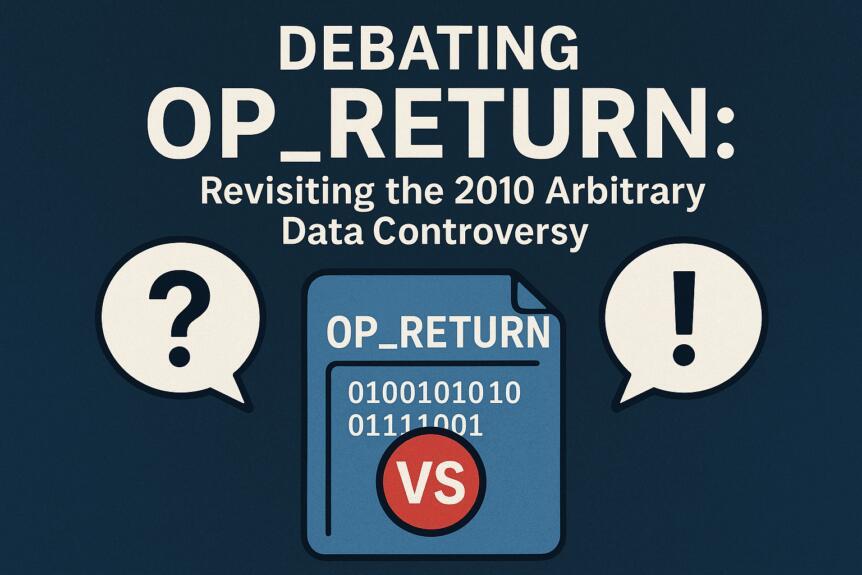Debating OP_RETURN: Revisiting The 2010 Arbitrary Data Controversy
-
The debate over data storage limits on the Bitcoin blockchain has reignited as Bitcoin Core developers prepare to remove the cap on arbitrary data within transactions in the upcoming v30 release. This change signals a significant shift in how the decentralized network manages on-chain data, sparking discussions about the future scope of Bitcoin's capabilities and its core principles. As the community grapples with these modifications, the broader implications for crypto regulation, blockchain scalability, and the development of Layer 2 solutions are increasingly coming into focus.
- Bitcoin Core v30 to eliminate the 80-byte cap on OP_RETURN, allowing unrestricted data storage in transactions. The move rekindles a long-standing debate about Bitcoin's intended use and data limits on the blockchain. Historically, Bitcoin's creator Satoshi Nakamoto introduced checks to limit onchain data, emphasizing transaction standardization. Miners' incentives influence the acceptance of non-standard transactions, challenging strict regulation enforcement. The development underscores tensions between decentralization, innovation, and potential corporate influence on Bitcoin's design.
The upcoming Bitcoin Core update is set to remove the previous 80-byte limit on the OP_RETURN opcode, a feature used for embedding arbitrary data onto the blockchain. This change marks a notable shift, prompting concerns over network bloat and the implications for blockchain scalability. Critics argue that unrestricted data storage could lead to increased transaction sizes and higher fees, potentially straining the network's capacity.
Satoshi Nakamoto's early post on Bitcoin Forum showcases the initial data-handling debates. Source: Bitcoin ForumBack in 2010, Satoshi Nakamoto laid the groundwork for transaction standards, including checks on on-chain data, to preserve Bitcoin's integrity. The decision to lift this cap now reflects evolving perspectives on blockchain flexibility and the potential utility of embedding non-financial data directly into transactions.
The controversy lies in the tension between innovation and the preservation of Bitcoin's core vision. Some community members question whether removing data limits aligns with Bitcoin's original decentralized and censorship-resistant ethos.
The Role of Incentives and Miner BehaviorBeyond technical specifications, the debate highlights the importance of incentives in a decentralized network. Without a centralized authority to enforce rules, miners-who validate and include transactions-play a critical role. Historically, miners have shown willingness to include non-standard transactions if it serves their economic interests, such as earning transaction fees.
This reality complicates efforts to impose strict protocol limits. Early adopters and developers recognize that enforcing rules contrary to miners' incentives is challenging, reinforcing the idea that market dynamics ultimately shape Bitcoin's on-chain environment.
Community Reactions and Future OutlookFollowing the release of the updated version, some users have already spearheaded patches that omit checks for transaction standardization. Christian Decker, a prominent Bitcoin developer, noted this as a pivotal moment:“Bitcoin is coming of age.”
Recent analyses indicate that miners like F2Pool are already including non-standard transactions that surpass previous OP_RETURN limits. This early activity suggests a growing acceptance, driven partly by the burgeoning development of Bitcoin-based systems such as Layer 2 networks and NFTs, which rely heavily on on-chain data storage.
This shift underscores an ongoing debate within the broader crypto community: balancing decentralization, scalability, and utility. As regulations evolve and on-chain applications expand, understanding the implications of such changes remains essential for investors and developers alike.
Crypto Investing Risk WarningCrypto assets are highly volatile. Your capital is at risk. Don't invest unless you're prepared to lose all the money you invest.
Legal Disclaimer:
MENAFN provides the
information “as is” without warranty of any kind. We do not accept
any responsibility or liability for the accuracy, content, images,
videos, licenses, completeness, legality, or reliability of the information
contained in this article. If you have any complaints or copyright
issues related to this article, kindly contact the provider above.
Most popular stories
Market Research

- Alt.Town Introduces $TOWN Token Utility Across Platform Services And Launches Valuefi Deposit Event
- BTCC Exchange Maintains 143% Total Reserve Ratio In September 2025 Demonstrating Continued Financial Strength
- Salvium Solves The Privacy Paradox: Salvium One Delivers Mica-Compliant Privacy That Exchanges Can List
- Zebu Live 2025 Welcomes Coinbase, Solana, And Other Leaders Together For UK's Biggest Web3 Summit
- Tapbit At TOKEN2049: Reshaping The Crypto Landscape Through Product Innovation
- Thrivestate Launches“Fly Before You Buy” Program, Enabling International Buyers To Explore Dubai Before Committing






















Comments
No comment